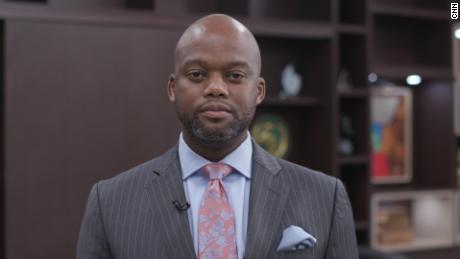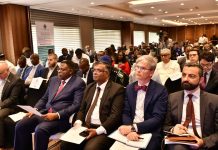‘Everywhere I go business executives ask me the same thing: ‘When are we going to see the benefits?’ And I provide the same answer: it will take time. But I think there is a sense of optimism that, quite frankly, I have never seen before on the African continent, about trade integration and market integration. We have taken a market of 1.2 billion people, a combined GDP of $3.4 trillion, into a single market – something that we have never seen before on the African continent.’ –Wamkele Mene
Eleni Giokos of CNN Business recently interviewed Wamkele Mene the Secretary General of the African Continental Free Trade Area (AfCFTA) Secretariat.
Eleni Giokos: How far are you in harmonizing rules, lifting tariffs and opening up borders?
Wamkele Mene: We have completed the easiest part – that is for 55 countries to negotiate a single set of rules. The most difficult part is implementation. We all know there’s differentials in levels of economic development (between African nations). We have a long way to go to build the capacity of our customs authorities, to make sure that our customs authorities across the length and breadth of the continent know exactly what the rules are.
It’s going to take a very long time. I always make the point that it took market integration in Europe over 72 years to get to the point where they are today. And so we, as Africans, should not expect that this is going to be easy. It’s going to be incredibly difficult, but I’m encouraged, in that we took the first step.
Entrepreneurs in Africa have great ideas. This will help them compete on a global stage
EG: When can businesses expect to benefit from market integration?
WM: If you’re a big corporation, you are able to access a new market instantaneously. Bigger corporations and institutional investors will be the immediate beneficiaries. Small-to-medium enterprises, that’s going to take perhaps two to three years. We are going to introduce a trade finance facility for small-to-medium enterprises that are primarily led by women, so that we quicken the period.
EG: We hear frequently about the potential of agribusiness. How are you thinking about the value chain in the sector?
WM: Africa is a net importer of agricultural products, and we have over 60% arable land on the African continent. So, we have to leverage that.
The big question for me is how do we actually get agriculture to be part of Africa’s industrial development? In the next few months, we are going to establish an industrial development forum. And in this industrial development forum, working together with the African Union, we are going to invite investors, industrialists, the private sector, government, and ask ourselves, as the African continent, which value chains do we want to focus on in the next three to four years?
We’ve made the big speeches. We’ve made the big policies about how we industrialize, and how we should position Africa for value added production. Now, it is time for us to have an action plan.
EG: What are you hearing from executives and the business community?
WM: Everywhere I go business executives ask me the same thing: ‘When are we going to see the benefits?’ And I provide the same answer: it will take time. But I think there is a sense of optimism that, quite frankly, I have never seen before on the African continent, about trade integration and market integration. We have taken a market of 1.2 billion people, a combined GDP of $3.4 trillion, into a single market – something that we have never seen before on the African continent.
EG: Some people don’t believe the continental free trade area will be implemented, because we failed in regional bodies before. What is the message that you’re giving to investors and executives out there?
WM: I believe with all my being that this agreement will be implemented. We have never had this level of political will and legal commitment before. I think we have to be patient. I think we have to be realistic about the challenges, and I think we have to look at the experiences of other regions around the world who have embarked on this journey of market integration, and how difficult this process is. However, we also know that the benefits certainly make the challenge worth pursuing.
Signed in March 2018, trading under the agreement officially began on January 1, and efforts are now focused on rolling out the plan effectively. The African Continental Free Trade Area (AfCFTA) has been heralded as a landmark agreement. Advocates say it will transform business across Africa by removing tariffs and making it easier to trade across borders.










